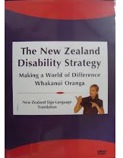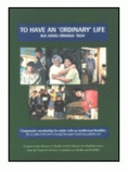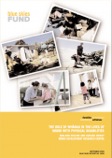Whānau, Disability, and Whānau Ora Research #1
Disability is not something individuals have. What individuals have are impairments… Disability is the process which happens when one group of people create barriers by designing a world only for their way of living, taking no account of the impairments other people have. (Ministry of Health (2001) New Zealand Disability Strategy, p.3)
This is the first of a series of posts on some of the publications that can help researchers understand the needs and aspirations of disabled Māori and their whānau.

In 2001 the Ministry of Health published the New Zealand Disability Strategy, ‘Making a world of difference – Whakanui Ōranga’. The Strategy sets out 15 objectives that contribute to a vision of a society where people with impairments can say that society highly values their lives and enhances their full participation. In other words, society becoming non-disabling. An important part of this is the recognition of the principles of the Treaty of Waitangi (p.6). Objective 11 speaks specifically to the promotion of participation by disabled Māori; “Disabled Māori should receive an equitable level of resource that is delivered in a culturally appropriate way” (p.12). Objective 12 is about the participation of disabled Pacific peoples, and promotes equitable culturally appropriate resourcing. Objective 15 speaks to valuing families, whānau and people providing ongoing support. For researchers the actions under the objectives can be used to assess service organisations’ capacity to be non-disabling.

In 2003 the National Health Committee published a report on community membership for adults with an intellectual disability. The Committee write that the title of the report, ‘To have an ‘ordinary life – Kia whai oranga noa’, “reflects the aspirations of adults with an intellectual disability to access the everyday things that others take for granted” (p.5). For Māori adults with intellectual disabilities this means living according to cultural values and having access to ordinary things like saying karakia (prayer) before eating, learning te reo (Māori language), participating in whānau gatherings, and being able to access traditional healing services.

In 2006 research by Adelaide Collins and Huhana Hickey on ‘The role of whānau in the lives of Māori with physical disabilities’ was published by the Families Commission. This Kaupapa Māori research project had three objectives; namely, to identify:
- The place of the whānau as an economic unit in lives of Māori with disabilities
- The role whānau plays in the lives of Māori with disabilities
- Facilitators of, and barriers to whānau wellbeing when a whānau member has a disability
From their interviews with a small number of disabled Māori the authors reported that,
The strength of the informants’ identity and that of their whānau proved to be the underlying factor that ensured whānau wellbeing. Informants drew strength from their cultural heritage, peace of mind from Māori spirituality, a sense of connectedness from Māori customary resources, and a deep respect for people from the values they inherited from their whānau and tupuna (ancestors) (p.33).
